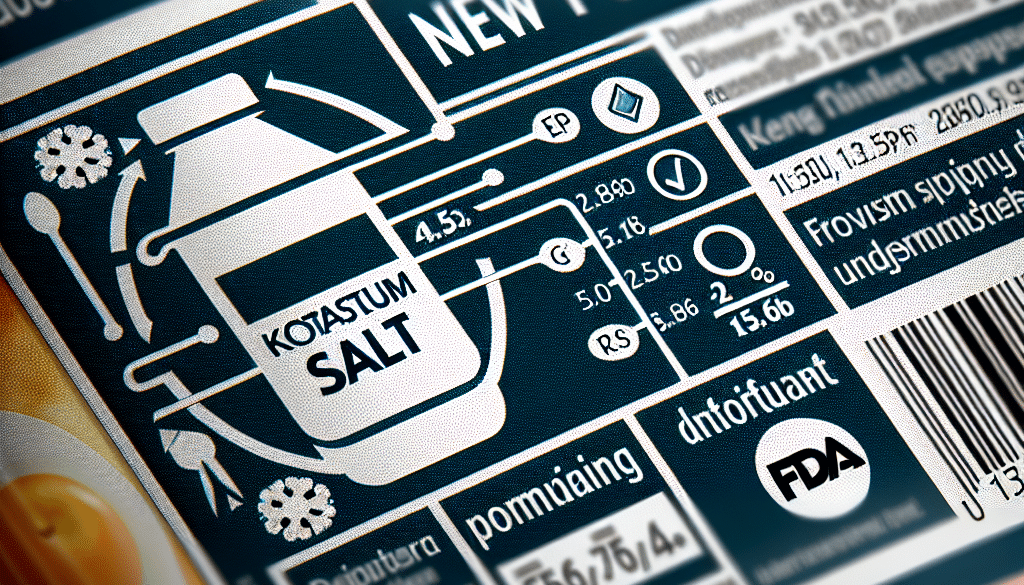FDA Takes Strides to Make Potassium Salt More Label-Friendly
-
Table of Contents
- FDA Advances Potassium Salt Labeling for Consumer Clarity
- The Importance of Potassium in the Diet
- Challenges with Current Potassium Salt Labeling
- FDA’s Efforts to Improve Potassium Salt Labeling
- Impact on Food Manufacturers and Reformulation
- Case Studies and Statistics
- Conclusion: A Step Towards Healthier Eating
- ETChem’s Protein Products: A Complementary Health Solution
FDA Advances Potassium Salt Labeling for Consumer Clarity

In an effort to promote healthier dietary choices among Americans, the U.S. Food and Drug Administration (FDA) has taken significant steps to make potassium salt—a healthier alternative to traditional sodium chloride (table salt)—more accessible and understandable on food labels. This move is part of a broader initiative to combat chronic health issues such as hypertension and cardiovascular disease, which are often exacerbated by high sodium intake. By making potassium salt labels more consumer-friendly, the FDA aims to encourage food manufacturers to reformulate their products and consumers to make more informed dietary decisions.
The Importance of Potassium in the Diet
Potassium is an essential mineral that plays a vital role in maintaining several bodily functions. It helps regulate fluid balance, muscle contractions, and nerve signals. A diet rich in potassium is associated with numerous health benefits, including reduced blood pressure and a lower risk of stroke, osteoporosis, and kidney stones. Despite its importance, many Americans do not consume enough potassium in their daily diets.
- Regulation of blood pressure and cardiovascular health
- Maintenance of fluid and electrolyte balance
- Support for healthy muscle function and nerve transmission
- Reduction in the risk of developing kidney stones
- Decrease in bone loss and the risk of osteoporosis
Challenges with Current Potassium Salt Labeling
One of the challenges with increasing potassium intake is that many consumers are unaware of what potassium salt is and its benefits. Potassium chloride is often used as a partial replacement for sodium chloride in food products to lower the sodium content. However, the term “potassium chloride” on ingredient lists can be confusing or off-putting to consumers who may not recognize it as a beneficial nutrient.
Additionally, the current labeling requirements do not always make it clear how much potassium is in a product, especially when potassium salt is used as a substitute for table salt. This lack of clarity can prevent consumers from making informed choices about their potassium intake.
FDA’s Efforts to Improve Potassium Salt Labeling
The FDA has proposed changes to the labeling of potassium salt to make it more consumer-friendly. The agency has suggested that “potassium salt” could be used as an alternative name for potassium chloride on food labels. This change is expected to help consumers better understand that potassium salt is a nutritious alternative to sodium chloride.
The FDA’s proposal also aligns with its broader goals of reducing chronic diseases associated with high sodium consumption. By encouraging the use of potassium salt in food products, the FDA hopes to promote a reduction in sodium intake across the population.
Impact on Food Manufacturers and Reformulation
The FDA’s labeling initiative is not only aimed at consumers but also at food manufacturers. By making potassium salt more label-friendly, the FDA is encouraging manufacturers to reformulate their products to be healthier. This could lead to a significant reduction in the sodium content of processed foods, which are a major source of sodium in the American diet.
Food manufacturers that take the initiative to reformulate their products with potassium salt can also use this as a marketing advantage. Products that are lower in sodium and higher in potassium can appeal to health-conscious consumers who are looking for better-for-you options.
Case Studies and Statistics
Several studies have shown the benefits of reducing sodium intake and increasing potassium intake. For example, the DASH (Dietary Approaches to Stop Hypertension) diet, which is high in fruits, vegetables, and low-fat dairy products (all good sources of potassium), has been proven to lower blood pressure.
Statistics from the Centers for Disease Control and Prevention (CDC) indicate that the average American consumes more than 3,400 milligrams of sodium per day, which is well above the recommended limit of 2,300 milligrams. By making potassium salt more accessible and understandable, the FDA aims to help Americans move closer to the recommended sodium intake levels.
Conclusion: A Step Towards Healthier Eating
The FDA’s move to make potassium salt more label-friendly is a positive step towards promoting healthier eating habits among Americans. By improving label clarity, consumers can make more informed choices, and manufacturers are encouraged to create healthier products. As the FDA continues to implement these changes, we can expect to see a shift in the market towards foods that support better health outcomes.
ETChem’s Protein Products: A Complementary Health Solution
In addition to considering potassium intake, consumers looking to improve their overall health should also focus on their protein consumption. ETChem offers a range of high-quality protein products that can complement a diet rich in potassium. Their protein offerings, including various types of collagen, are perfect for those seeking to support their health and wellness through nutrition.
ETChem’s protein products are ideal for a variety of applications, from sports nutrition to weight management and general health supplements. With a commitment to quality and customer satisfaction, ETChem is a go-to source for all your protein needs.
About ETChem:
ETChem, a reputable Chinese Collagen factory manufacturer and supplier, is renowned for producing, stocking, exporting, and delivering the highest quality collagens. They include marine collagen, fish collagen, bovine collagen, chicken collagen, type I collagen, type II collagen and type III collagen etc. Their offerings, characterized by a neutral taste, instant solubility attributes, cater to a diverse range of industries. They serve nutraceutical, pharmaceutical, cosmeceutical, veterinary, as well as food and beverage finished product distributors, traders, and manufacturers across Europe, USA, Canada, Australia, Thailand, Japan, Korea, Brazil, and Chile, among others.
ETChem specialization includes exporting and delivering tailor-made collagen powder and finished collagen nutritional supplements. Their extensive product range covers sectors like Food and Beverage, Sports Nutrition, Weight Management, Dietary Supplements, Health and Wellness Products, ensuring comprehensive solutions to meet all your protein needs.
As a trusted company by leading global food and beverage brands and Fortune 500 companies, ETChem reinforces China’s reputation in the global arena. For more information or to sample their products, please contact them and email karen(at)et-chem.com today.




